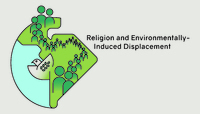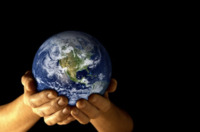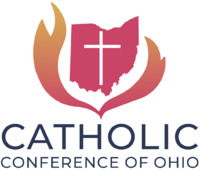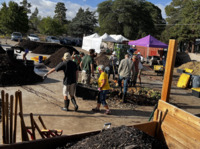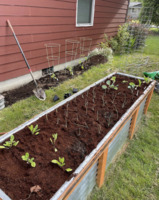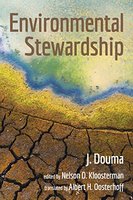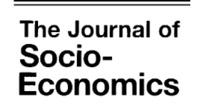Search
159 items
-
Religion and Environmentally-Induced Displacement
The goal of this project is to enhance people's understanding of the religious response to environmental displacement in Latin America. This database includes a list of past workshops and public events related to the subject as well as relevant documentaries on the topic. -
Checking on the Chickens With the Next Generation
"Checking on the chickens with the next generation. We built the coop from recycled materials, the chickens eat much of our food waste, provide eggs, and encourage us to think about the cycle of our consumption and how we can be more sustainable. We want our son to approach his entire life this way, and these chickens will be his responsibility as soon as able. We live in the city of Columbus so we try to bring a different lifestyle to city living."
Taken by Grace Freeman. Submitted to the Sustainability Photo Contest. -
Threat of Global Warming/Climate Change - 2006 Statement of Conscience
This resource contains the climate statement of the Unitarian Universalist Association.
"Earth is our home. We are part of this world and its destiny is our own. Life on this planet will be gravely affected unless we embrace new practices, ethics, and values to guide our lives on a warming planet. As Unitarian Universalists, how can our faith inform our actions to remedy and mitigate global warming/climate change? We declare by this Statement of Conscience that we will not acquiesce to the ongoing degradation and destruction of life that human actions are leaving to our children and grandchildren. We as Unitarian Universalists are called to join with others to halt practices that fuel global warming/climate change, to instigate sustainable alternatives, and to mitigate the impending effects of global warming/climate change with just and ethical responses. As a people of faith, we commit to a renewed reverence for life and respect for the interdependent web of all existence." -
How Religion Intersects With Americans' View on the Environment
Through this study, they intended to obtain information about how religious Americans view climate change. This article explains the results of a survey. It shows how some religious Americans express little concern about climate change, and carry the belief that “there are much bigger problems in the world, that God is in control of the climate.” Additionally, some say that “they do not believe the climate is actually changing.” This survey also sheds light on other concerns religious Americans carry, such as fear surrounding the consequences of environmental regulations (fewer jobs, increased energy prices, and loss of individual freedoms).
Additionally, the survey extends to other religious affiliations as well as the religiously unaffiliated population. -
Turning Around Our Relationship with Earth is a Teshuvah Project
The author recounts an unsettling encounter with a utility worker who downplayed the environmental harm of her gas leak. From here, she explains the true negative impacts of methane emissions on both people and the climate, and encourages us to act in a way that "turns around our relationship with Earth". She connects this with the Jewish tradition of Teshuvah, the time in between Rosh Hashanah and Yom Kuppur meant for repentance. -
Care for Creation - Catholic Conference of Ohio
"The Catholic Bishops of Ohio invite you to study the issues related to the stewardship of God’s creation. Care for the environment is a fundamental principle within Catholic Social Teaching. We applaud efforts already underway in many Catholic homes and institutions that help conserve energy, protect the environment, and advance a greater understanding of faithful stewardship. We hope that Catholic families and institutions around the state will continue in such efforts."
This resource includes a statement calling to care for God's creation and contains information and links to several other resources related to religion and environmentalism. -
Al-Mizan: Covenant for the Earth
"The Covenant presents an Islamic outlook on the environment in a bid to strengthen local, regional, and international actions to combat the triple planetary crises defined by the United Nations as climate change, biodiversity loss and pollution. It is a global endeavour to engage Muslims from all levels of society in the development and adoption of this call...
Al-Mizan - A Covenant for the Earth is a restatement of the principles governing the protection of nature in a form that meets current challenges. It examines the ethics behind the social patterning of human existence and enquires into how they could be brought to life today working in harmony with the heartbeat of the natural world." -
A Walk with Sustainability…and the Bolivian Llamas
"In this picture, I am working alongside two rural Bolivian community members (and a llama), collaborating on the design of a water system. The community had no running water, phone service only on hills, cut plastic liter bottles in half for gutters, and still gave me soups and meals as a welcoming and thankfulness. Their kindness, harmony with the land around them, and joy radiated, deeply resonating with my idea of how to live a sustainable, happy life. Sustainability is not buying a reusable water bottle…every 3 months because a new, better, more cool version is here. It is living in gratitude and simplicity with the people and nature around you." Taken by Megan Oleksik. Submitted to the RESTORExchange Sustainability Contest. -
EPN Signature Earth Day Event - Monday, April 22, 2024: Eat This Earth Day! Ohio's Native Plants for Food
"Ohio State’s Environmental Professionals Network, in collaboration with the Chadwick Arboretum and Learning Gardens and native plant enthusiasts from across the state, proudly invite you to eat and drink from Ohio’s native plants this Earth Day! Discover through your senses, the edible flora of the Buckeye State. Over long periods of history, through the tastes, smells, and eyes of diverse native wildlife and human cultures, both ancient and present, these plants have sustained life."
This event will take place on Earth Day, April 22, 2024 from 4:45 pm to 7:30 pm. Admission is free and the event will be held at the Fawcett Center in Columbus, Ohio. Food and drinks will be provided. -
Eat Close To The Ground!
"Eat Close To The Ground!" Taken by Linda Sterling. Submitted to the RESTORExchange Sustainability Photo Contest. -
Exploring Fresh Produce in a Chinese Wet Market
"Exploring Fresh Produce in a Chinese Wet Market: The diverse array of vegetables is what I long for the most about my homeland China, and there is no better place to shop for vegetables than wet markets, where produce is locally sourced. This is what sustainability looks like for me––where people eat green and shop locally. The photo features a typical vegetable stall at Tuandao Market in Qingdao, my partner’s hometown, where we savored last year’s summer together." Taken by Mianmian Fei. Submitted to the RESTORExchange Sustainability Photo Contest. -
Gateway Into Sustainability
"This photo depicts a gateway into sustainability. Portraying a pathway into a huge lush garden. I believe gardens of any kind are a sustainable practice. That brings people closer to the earth while also providing a variety of amenities for said people. Not to mention the wildlife that flourishes too.This photo was taken in the fall of 2022 at the botanical gardens in Madison WI. In my mind I envision you’re entering a new world which is a lush paradise. Among that it’s filled with vocal birds, reptiles of all kinds, an array of colorful flowers. On the flip side I also envision as if you’re leaving the suffocating, bland concrete world behind." Taken by Logan Gosse. Submitted to the RESTORExchange Sustainability Photo Contest. -
Voting and Our Common Home: Reflections from the Catholic Tradition
This resource shares information and resources related to the importance of voting for environmental issues on the basis of Catholic religious beliefs. This document is available in both English and Spanish and raises multiple different issues and considerations connecting religion, environmental issues, and voting. -
A Jewish Response to Environmental Stewardship: LEEDing the Way
The article highlights Temple Israel of Minneapolis's achievement of LEED Gold Certification, reflecting their commitment to sustainability through a multi-year renovation project. This accomplishment aligns with their Jewish values, particularly the principle of Pikuach Nefesh, which emphasizes protecting life and the environment. The synagogue's efforts extend beyond their building to include community-wide initiatives such as climate action resource fairs and partnerships with environmental organizations. Their ongoing commitment to sustainability is showcased through continuous improvements and active participation in broader climate justice movements. -
Resources for Preaching & Speaking on Climate Change
The resource gives information for preachers and other religious figures to use when talking about climate change. It starts by giving reasons for preaching about climate change and why it is important for us now and in the future. It also gives facts from scientists on the climate which mentions the aspects of climate change such as the causes and effects on the environment, and what humans can do to help. The article then gives biblical themes related to climate change and also gives advice for religious leaders to overcome possible barriers when preaching. -
Ancient Judean Dates
A date tree planted in Ketura, Israel from 2000 year old seeds found at an archeological site in the Judean wilderness has finally bore fruit earlier this month (September 2020). The harvest was hailed a modern miracle of science. “In these troubled times of climate change, pollution and species dying out at alarming rates, to bring something back to life from dormancy is so symbolic,”... Date palms were praised in the Bible and the Quran, and became symbols of beauty, precious shade and succulent plenty. -
Engaged Organizations: Global Oneness Project
The Global Oneness Project was founded in 2006 as an initiative of Kalliopeia Foundation, and is focused on education aimed a planting seeds of empathy, resilience, and a sacred relationship to our planet. They are passionate about the power of stories and offer a rich library of multimedia stories comprised of award-winning films, photo essays, and essays as well as companion curriculum and discussion guides focused on world culture, social justice and sustainability. -
What Karl Marx has to say about today's environmental problems
Ted Benton, a Professor of Sociology at the University of Essex, writes about how Marx's theories can be applied to modern environmental issues such as climate change. He talks about how Marx's ideas about capitalism relate to current exploitation of nature, and specifically about soil degradation which was an issue during the 1860s when Marx was alive. He also includes problematic parts of Marx's attitudes towards nature, such as his praise of increased productivity of land that may have inspired Stalin. -
Environmental Stewardship
This book goes into detail about how the Christian religion goes about environmental stewardship. They look at how bible passages talk about preserving the Earth and the morals we should have surrounding it. It dives deep into how science interacts with human interaction with the Earth and the damage that we have done to Earth, as well as what we should do to correct ourselves. -
How Buddhist monks in Ladakh are fighting climate change
Buddhists Monks in the Himalayas are taking a stand to climate change. On Earth Day 2018, thousands of people came together in the village of Yerat to plant trees. The region is rapidly losing glaciers, causing a shortage in water supply to the villages in the area who rely on snowmelt for water. The volunteers were inspired to participate due to their devotion to His Holiness Kyabgön Chetsang Rinpoche and his vision for "a more verdant and organic Ladakh." -
Five Years After Speaking Out on Climate Change, Pope Francis Sounds an Urgent Alarm
This article covers Pope Francis's reaction to the world governments responses to climate change. The Pope writes to unite people through religion in an effort to bring awareness to the movement. The article details how the church is divesting in fossil fuel companies. The article also focuses on the political divide and how it affects people's views on the climate crisis. -
Overpopulation and the Lifeboat Metaphor: A Critique from an African Worldview
Many scientists have warned that the earth is nearing overpopulation or has already reached its carrying capacity. Garret Hardin proposed the lifeboat ethics metaphor to address this crisis and proper resource distributions. Okyere-Manu comments that this metaphor does not take into account the African political and cultural worldview. Hardin's metaphor is also reliant on inequality which disproportionately affects vulnerable communities. -
Himalayan Institute
Founded in 1969 by the great teacher and humanitarian, Swami Rama, the Himalayan Institute acts on the basis of yoga tradition and Eastern spirituality. Through the living connection to an ancient wisdom tradition of the Himalayan Masters, and the guidance of spiritual head Pandit Rajmani Tigunait, the Himalayan Institute seeks to serve communities across the globe of those who seek to live their spiritual values. The institute provides resources for anyone seeking spiritual wellness such as yoga and meditation training, local retreats and seminars, and domestic and international excursions, frequently taking the form of a trek through the Himalayas. The Himalayan Institute strives for sustainable living in partnership with the community in Honesdale and also in their projects in India and Africa- providing sustainable living, jobs, and farming in several different communities. -
Religion and animal welfare: Evidence from voting data
This article, written by Julio Videras, works to analyze the factors that contributed to a 2002 ban on farming practices in Florida that were deemed cruel to pigs. Not only is religion taken into account (specifically Catholicism and Evangelical denominations), but political and socioeconomic factors are also considered. Videras argues that political affiliation and socioeconomic factors play more of a role in people's opinion of the ban than religious factors do.

